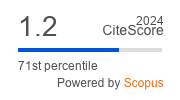Psycholinguistic Aspects of Phraseology as Theoretical and Methodological Foundations of Children’s Speech Enriching by Expressive and Stylistic Language Means
Keywords:
psycholinguistic units, psychological units, linguistic units, psycholinguodidactic principles, linguodidactic principles.Abstract
The article discusses the problem of phraseologisms as a multidimensional scientific phenomenon, which can be regarded as different units, such as: psychological, psycholinguistic and linguistic; lighting of psycholinguistic principles derived from an understanding of phraseological units as psycholinguistic ones: special blocks of economical, precise, well-aimed and witty production and speech understanding as well as introduction of these principles in the field of applied psycholinguistics, in particular in psycholinguistics of development and a subordinate to it in theoretical and methodological sense linguistics; disclosure on the material of specific experimental study of the author’s experience with taking into account the psycholinguistic basics when developing a method of speech enrichment by phraseological units of the senior preschool children with a view to its development.
References
- Vygotsky, L. (1982). Myshlenie i rech’ [Thinking and speech]. Vol. 2. Moscow: Pedagogika.
- Vinogradov, V. (1955). Itogi obsuzhdenija voprosov stilistiki [Results of the discussed questions
on stylistics]. Voprosy Yjazykoznanija, 1, 60−87. - Dmitrjuk, N. (2009). Frazeologicheskij somatikon kak otrazhenie arhetipov jazykovogo soznanija
jetnosa [Phraseological somaticon as a reflection of archetypes of ethnic linguistic consciousness].
Voprosy Psiholingvistiki, 10, 30−33. - Jermolenko, S. (1987). Fol’klor i literaturna mova [Folklore and a literary language]. Kyiv:
Naukova dumka. - Kalmykova, L. (2008). Psyhologija formuvannja movlennjevoi’ dijal’nosti u ditej doshkil’nogo
viku [Psychology of speech activity formation in children of a pre-school age]. Kyiv: Feniks. - Kasares, H. (1985). Vvedenie v sovremennuju leksikografiju [Introduction into contemporary
lexicography]. Moskva : Izd-vo inostr. lit. - Kovshova, M. (2010). Lingvokul’turologicheskij analiz i associativnyj jeksperiment vo
vzaimodejstvii: na primere frazeologizmov so slovom-komponentom hleb [Lingvoculturological analysis
and associative experiment in interaction: on the example of phraseologisms having a component bre].
Voprosy psiholingvistiki, 2 (12), 165−176. - Kosmeda, T. (2000). Aksiologichni aspekty pragmalingvistyky [Axiological aspects of
pragmalinguistics]. L’viv : LNU im. Ivana Franka. - Leontyev, A. (2003). Osnovy psiholingvistiki [Bases of psycholinguistics]. Moscow: Smysl.
- Lepeshaw, I. (1998). Frazealogija suchasnaj belaruskaj movy [Phraseology of modern
Byelorussian language]. Minsk: Vysshaya Shkola. - Mit’kina, I. (2002). Osvoenie frazeologizmov starshimi doshkol’nikami [Learning
phraseologisms by senior preschoolers]. Razvitie detskoj rechi: tradicii i perspektivy: materialy
konferencii. Moscow: Izd. RAO. 47−48. - Novikova, A. (2012). K voprosu o neverbal’nom komponente frazeologii [On the problem of
nonverbal component of phraseology]. Zhizn’ Yazyka v Kul’ture i Sotsiume-3, 40−43. - Stepanova, A. (2012). Psiholingvisticheskij podhod k opisaniju frazeologicheskih edinic
russkogo jazyka [Psycholinguistic approach to description of Russian phraseological units]. Voprosy
psiholingvistiki, 1 (15), 124−133. - Uzhchenko, V., Uzhchenko, D. (2007). Frazeologija suchasnoi’ ukrai’ns’koi’ movy
[Phraseology of modern Ukrainian language]. Kyiv: Znannia.







 Creative Commons «Attribution» 4.0
Creative Commons «Attribution» 4.0